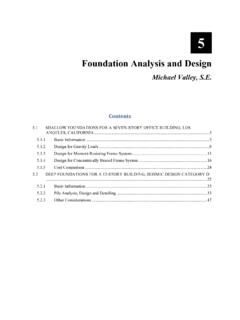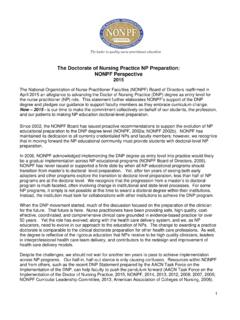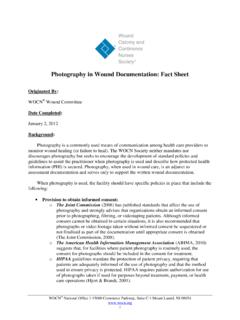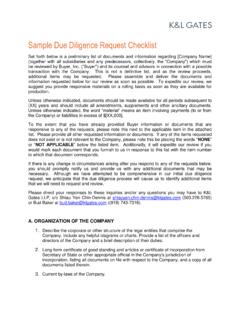Transcription of THE COMPANIES ACT, NO. 71 OF 2008
1 THE COMPANIES ACT, NO. 71 of 2008AN EXPLANATORY GUIDER eplacing the COMPANIES Act, No. 61 of 1973 Department of Trade and Industry, dti Campus77 Meintjies StreetSunnysidePretoria0002the dtiPrivate Bag X84 Pretoria0001the dti Customer Contact Centre: 0861 843 384the dti Website: information booklet serves as an explanatory guide to, and general reference tool about the stipulations of the COMPANIES Act, No. 71 of 2008. It may not be used as an exhaustive legal reference or substitute for the Act. CONTENTSBACKGROUND ..6 MAIN FEATURES OF THE COMPANIES ACT ..8 COMPANY LEGISLATION PLAN ..12 INSTITUTIONAL REFORMS ..14 The COMPANIES and Intellectual Property Take-over Regulation Panel ..15 The Financial Reporting Standards Council.
2 15 The COMPANIES Tribunal ..15 CATEGORIES OF COMPANIES ..18 Non-Profit COMPANIES ..18 Profit COMPANIES ..18 Personal Liability COMPANIES ..19 State-Owned COMPANIES ..19 Public COMPANIES ..19 THE FUTURE OF CLOSE CORPORATIONS ..22 COMPANY FORMATION ..24 COMPANY NAMES ..26 MEETINGS AND NOTICES ..30 duties OF DIRECTORS ..32 ACCOUNTABILITY AND TRANSPARENCY ..34 Flexible Regime ..34 Rotation of Auditors ..34 Audit Committees ..35 Appointment of a Company FINANCE ..38 COMPANY GOVERNANCE ..40 BUSINESS RESCUE REGIME ..42 REMEDIES ..46 ENFORCEMENT ..48 CONTACT DETAILS ..504 THE COMPANIES ACT, NO. 71 of 2008AN EXPLANATORY GUIDE5 THE COMPANIES ACT, NO. 71 of 2008AN EXPLANATORY GUIDEBACKGROUND6 THE COMPANIES ACT, NO. 71 of 2008AN EXPLANATORY GUIDEBACKGROUNDThe process of developing the COMPANIES Act, No.
3 71 of 2008 began in earnest over five years ago. For guidance, the developers looked to South African Company Law for the 21st Century: Guidelines for Corporate Law Reform (May 2004), a policy document developed by the Department of Trade and Industry (the dti). The ultimate goal in repealing the COMPANIES Act, No. 61 of 1973, was to ensure that the regulatory framework for enterprises of all types and sizes promoted growth, employment, innovation, stability, good governance, confidence and international competitiveness. The COMPANIES Act was introduced in Parliament during 2008 and published for general comment on 27 June 2008 as Bill No. 61 of 2008. The Portfolio Committee on Trade and Industry received a large volume of written comments, as well as oral representations during the public hearings on the COMPANIES Bill, in the latter half of 2008.
4 These comments and representations had a significant influence on the content of the Bill, as finally approved by the Committee and Parliament in November 2008. The Act was translated into Afrikaans as the other official language and signed-off by the President in April 2009. Due to a sunset clause in the Act, the Act could not be put into operation within a period of one year after promulgation. It is envisaged that the Act will become effective in April 2011, when all sub-delegated legislation matters, including regulations, have been resolved. 7 THE COMPANIES ACT, NO. 71 of 2008AN EXPLANATORY GUIDEMAIN FEATURES OF THE COMPANIES ACT8 THE COMPANIES ACT, NO. 71 of 2008AN EXPLANATORY GUIDEMAIN FEATURES OF THE COMPANIES ACTThe main features of the COMPANIES Act, 2008 are as follows: It has been modernised and brought into line with international best practices.
5 This applies in particular to public COMPANIES , communications and corporate governance. At the same time, it has been harmonised with other South African legislation, such as the Promotion of Access to Information Act (PAIA) and the Electronic Communications and Transactions (ECT) Act. It has been simplified and made less prescriptive to make it easier to understand and apply, in the following ways: o It was drafted in plain language and the number of sections has been reduced from 450 to 225. o The rules relating to pre-incorporation contracts have been simplified, making it possible for any person to enter into a pre-incorporation contract. o Fewer statutory forms are required to incorporate a company. Rather than a memorandum and articles of association, a company s constitutional documents will now consist of one document only, the Memorandum of Incorporation (MoI).
6 The MoI sets out the rights, duties and responsibilities of shareholders, directors and others in relation to the company. A company may alter certain provisions of the Act in its MoI, but there are specific provisions that may not be altered that apply notwithstanding the provisions of the Memorandum of Incorporation. In this way, certain protections are built into the Act. All current articles and memoranda of association will automatically be converted to an MoI. o COMPANIES are allowed to change certain requirements according to their own circumstances in addition to the MoI, COMPANIES can now make certain governance rules themselves. o Different types of COMPANIES must comply with different rules.
7 This means smaller COMPANIES have less arduous responsibilities than large public COMPANIES when it comes to corporate governance and financial reporting. For instance, smaller COMPANIES will be subject to less taxing financial reporting standards than larger COMPANIES . 9 THE COMPANIES ACT, NO. 71 of 2008AN EXPLANATORY GUIDE The regulatory burden on COMPANIES has been reduced, but there are stricter accountability and transparency requirements for state-owned and public COMPANIES . Shareholders have extensive rights to obtain information from the company, including access to the securities register and minutes of directors meetings.
8 Greater director accountability and the appropriate participation of all stakeholders ensure improved transparency. High standards of corporate governance are encouraged, with minimum accounting standards having been set for annual reports. So too, there are stricter provisions governing directors conduct and liability, and their common law duties and liabilities have now been codified. A new feature is that an act of a company is not void solely because the company did not have the capacity to do the act or the directors did not have the authority to perform the act on behalf of the company. No person may rely on this lack of capacity, power or authority in legal proceedings, except in certain specified circumstances.
9 A company is specifically prohibited from reckless, negligent or fraudulent trading, and persons who were knowingly party to such conduct are guilty of an offence. The Act contains new structural arrangements, with the introduction of new regulatory institutions and the transformation of others. COMPANIES are now classified as either profit or non-profit COMPANIES . Take-overs and fundamental transactions receive greater attention, with radical changes to the take-over provisions contained in the COMPANIES Act, 1973. This applies particularly with regard to minority shareholding and appraisal rights for dissenting minority shareholders. New rules relate mergers and amalgamations, allowing two COMPANIES to merge into one entity, provided that the solvency and liquidity test is satisfied and certain approvals are obtained.
10 Capital maintenance will now be based on solvency and liquidity rather than a minimum amount of share capital consisting of par value shares and nominal value shares. The concept of business rescue is broadened and formalised, and provision is made for a modern business rescue regime. Schemes of arrangement are dealt with separately under the Act. There is a move towards the decriminalisation of company law and the establishment of bodies for the effective enforcement of the legislation. However, minority shareholders and other stakeholders, such as employees, will have better protection, powers and remedies under the Act, including the ability to bring class COMPANIES ACT, NO. 71 of 2008AN EXPLANATORY GUIDE11 THE COMPANIES ACT, NO.














